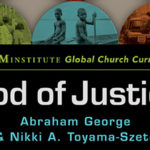Posted: 8/22/03
ANOTHER VIEW:
Some talk of God's glory can make God too small
By Roger Olson
In the 1970s, a popular Christian book asked, “Is Your God Too Small?” Author Paul Little gently ridiculed the all-too-tiny gods of many American Christians, including the bell-hop god who jumps to answer every whim of praying people.
The main thrust of Little's book was that too many North American Christians have forgotten the sovereignty and majesty of the God of the Bible. That was a needed corrective to popular folk religion in an age when many people were calling God our “good buddy in the sky” (borrowing on citizens' band radio lingo) and falling for all kinds of theologies that trivialized God.
Today, we might ask, “Is your God too big?” Some evangelical writers and speakers are over-reacting to the trivialized and tiny deities of folk religion by inflating God's majesty and sovereignty at the expense of his loving kindness and mercy.
Of course, no biblically serious Christian really believes it is possible to conceive of God as “too big.” That includes this writer. It's a tongue-in-cheek question meant to get attention. But that doesn't take anything away from the seriousness of the issue behind the question.
While it may not be possible to conceive of God as too big (as we all know he's “big enough to rule the mighty universe”) it is possible to deny the other side of God's nature (“yet small enough to live within my heart”).
Thousands of Texas Baptists and other young people flock to massive Christian youth events to hear Minnesota pastor and writer John Piper, who encourages them to focus on God's glory and proclaim God's renown to all people. In his books, sermons and occasional papers published at his website (Desiring God Ministries) the pastor of Bethlehem Baptist Church in downtown Minneapolis promotes the theology of Jonathan Edwards. He seldom mentions Edwards by name, but anyone familiar with the 18th century Puritan preacher of New England readily recognizes his influence on Piper's theology.
Why does God do anything at all–including create us and redeem some of us (the elect) from sin and condemnation? For his own good pleasure and glory, according to Edwards and Piper.
Why does God foreordain even sin and evil? For his own good pleasure and glory.
Does God ever merely allow bad things to happen? Certainly not. For his own good pleasure and glory and out of purposes hidden to us, God sovereignly controls even the terrorists who attacked the World Trade Center twin towers on Sept. 11, 2001.
Many Calvinists speak of the mystery of God's sovereignty; Piper makes no mystery of his own view that God controls everything that happens and never merely allows any event or decision, however evil it is. Even the fact that untold millions of God's human creatures–created in his likeness and image–are predestined by God to spend eternity suffering in the flames of hell is for his own glory.
God's sole ultimate and final purpose in everything he does is to glorify himself by displaying the full range of his attributes. At least in some of his writings, Piper fails to mention love as one of them. When he does mention love, it is God's love for his own glory that takes center stage; God's love for us is only for the sake of glorifying himself in showing mercy to the elect.
All that is debatable; evangelical Christians including Baptists have debated the details of God's majesty and sovereignty for centuries. For the most part, we've learned to live with our different perspectives.
Now, however, according to constant reports from youthful listeners, Piper is telling our young people they've been sold a bill of goods by the generation before them. That bill of goods is that Christ came to Earth to die on the cross for them. Instead, the Minnesota preacher passionately assures his young listeners, Christ died for God.
According to this line of reasoning, it is arrogant of us to think that the sovereign, glorious God would focus his purposes on us. We are not the center of God's plan and purpose in creation and redemption. Instead, everything God does is for his own glory and good pleasure.
Oh, of course, some of us (the elect) benefit from Christ's death on the cross. But that shouldn't be the focus of our attention or reason for our praise of God. Christ died for God before he died for us. That is, according to Piper, the purpose of God in Christ's death was not primarily loving kindness and compassion toward us but vindication of God's righteousness.
Piper certainly is right to point his listeners and readers to God and away from self-absorption. Too much popular folk Christianity has focused on what God can do for us. The gospel of health and wealth proclaimed on religious television is a travesty in that it makes God a great cosmic slot machine into which we feed our “seed faith offerings” in order to reap worldly rewards. Too many choruses and devotional talks focus on what being a Christian does for believers and not enough on the greatness of God.
But the pendulum is swinging–perhaps too far. Scripture assures us repeatedly that God loves us (John 3:16) and sent his Son, Jesus Christ, to die for us (Romans 5:8). The assertion that Christ died for God is true and needs to be heard and taken seriously. The implication–heard by many of Piper's youthful listeners–that Christ did not die equally for us is false and needs to be corrected.
This is a case of false “either/or” thinking. Surely the New Testament tells us that Christ died both for God (his glory and honor) and for us (because God loves us and wants to rescue us from condemnation and the ravages of sin).
Romans 5 could not be clearer. It is possible to dishonor God by denying his own loving purposes; it dishonors God when we imply that he loves and cares above all about his own glory and not equally about our well-being for our sakes. That makes God out to be the ultimate egoist–a cosmic self-centered dictator who demands homage not for his goodness but only for his greatness.
But the fact is, according to Scripture, God is love. Love is concerned for others and shows that concern in acts of loving kindness. Yes, the perfect love is between Father, Son and Holy Spirit, but it intentionally overflows in love for humanity.
The purpose of the cross was not only God's glory; it also was just as much God's passionate love for his fallen and dying creatures who he loves dearly. The Psalmist often praised God for his acts of mercy and kindness and not only for himself.
We need to be careful not to pit God's glory against God's passionate love and care for humanity. The two are inseparable. One should not be elevated above the other.
Piper and his promoters are to be commended for raising our young peoples' consciousness of the greatness of God. They are to be lauded for turning the attention of youth away from spiritual and material self-absorption to the holy God of the universe.
But even a wonderful message can take a pernicious twist. Piper and those who promote his message need to be gently corrected and urged to find the balance between the extremes of humanistic, self-centered spirituality on the one hand and exclusive focus on God's glory to the detriment of his personal, loving nature on the other hand.
Did Christ die for God? Absolutely. Did he die also for us? Most definitely. It's both/and and not either/or.
The God proclaimed by John Piper is sometimes “too big” in the sense that he doesn't seem personal enough to come near and dwell with us for our sakes. He's aloof and self-absorbed. That's not the loving, self-emptying, often vulnerable, caring and suffering God of the Bible. We need to hold both sides of God in Scripture in proper balance–his unspeakable greatness and his unbelievable goodness toward us.
Roger Olson is professor of theology at Baylor University's Truett Theological Seminary in Waco














We seek to connect God’s story and God’s people around the world. To learn more about God’s story, click here.
Send comments and feedback to Eric Black, our editor. For comments to be published, please specify “letter to the editor.” Maximum length for publication is 300 words.